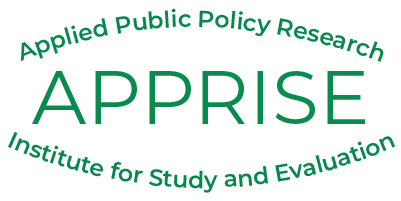What Does A Policy Analyst Actually Do?
What do you think of when you hear “Policy Analyst?” When I heard these words during my senior year, I envisioned an academic bent over a desk reviewing congressional legislation and municipal policies. However, being a Policy Analyst is so much more dynamic than simply reading reports and analyzing documents. As a Policy Analyst at APPRISE, I have had the opportunity to create and conduct surveys, analyze data, and attend trainings and conferences held nationwide.
During my time at NYU, I double majored in Environmental Studies and French. I have always wanted to work in the field of environmental sustainability. However, I did not have a clear idea of the kind of role I wanted to be in, after graduation. Thankfully, I fell into the Policy Analyst role which has allowed me to learn and develop a wide range of disciplines, some of which are outlined below.
Creating and Conducting Surveys
Since becoming a Policy Analyst, I have learned how to create survey instruments, the best practices to conduct surveys, and how to best meet the needs of different survey respondents. Surveys are an extremely important tool in the Policy Analyst toolbox. It may sound obvious, but one of the most effective ways to assess the direct and indirect impacts of a program or policy on communities is by talking directly to the community to understand how they have been affected. At my job, we often work on low-income policies that target marginalized populations. Historically, many of these communities have been excluded from the development and implementation of policies and programs. Therefore, conducting surveys and incorporating the results into policies is a critical step in enabling communities affected by policies to actively participate in the decision-making process. My favorite part of conducting surveys is talking to such a diverse group of people and hearing what they think about different programs.
Data Analytics
Policy Analysts do not only work with reports; we also work with quantitative data. In fact, I would argue that many Policy Analysts are also Data Analysts. One of the main types of programs that I evaluate at my job are energy assistance programs. In order to evaluate these programs, my coworkers and I have to clean, transform, and analyze large datasets containing more than hundreds of thousands of observations to analyze the impact that these programs have on participants’ bills and energy usage. To do this, we employ Stata’s built-in statistical software techniques, including regressions and t-tests. Ultimately, I want to become a Data Scientist, so this role has been imperative in helping me build my data analytics skills. My advice to anyone seeking to become a Data Professional who may not have a “traditional” STEM background is to look for work as a Policy Analyst to help build your technical competencies to prepare you for future jobs.
Trainings and Conferences
Lastly, and possibly one of my favorite aspects, of being a Policy Analyst is our access to countless conferences and training opportunities. Unfortunately, due to COVID-19, I have yet to attend any conferences in-person. However, I have heard from my colleagues that, in the past, they travelled to San Diego, New Orleans, and Nashville to learn from industry experts and engage in valuable networking opportunities. I hope to be able to attend an in-person conference soon!
Though I work for an energy research organization, I have learned about the intersection of public health and energy efficiency, financial institutions, human behavior, and decision making. In addition, I have learned about equity and environmental justice. Lifelong learning is extremely meaningful to me, and I am lucky enough to do so every day as a Policy Analyst.
Written by: Charlotte Dankwah, APPRISE Policy Analyst, NYU Class of 2021

Charlotte Dankwah, APPRISE Policy Analyst

